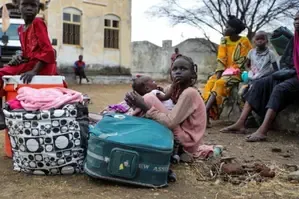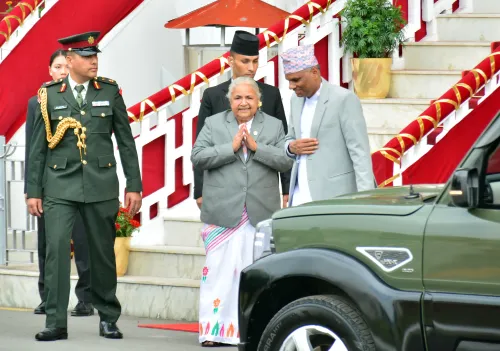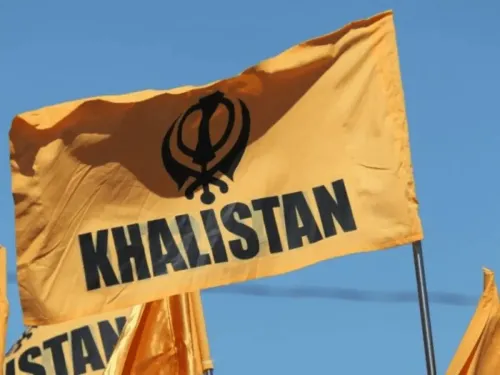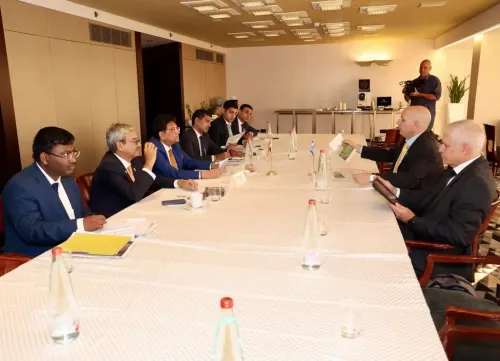Immediate Global Action Required as Sudan Conflict Enters Year Three: IOM

Synopsis
Key Takeaways
- 11.3 million individuals are internally displaced in Sudan.
- Conflict has created the world's largest displacement crisis.
- 30 million people, including 16 million children, need humanitarian aid.
- IOM's response plan is only 10% funded.
- Immediate international funding is critical for ongoing operations.
Geneva/Port Sudan, April 15 (NationPress) As the devastating war in Sudan marks its third year on Tuesday, the International Organization of Migration (IOM) has urgently called for a coordinated global response to alleviate the unprecedented level of human suffering inflicted by the conflict and to avert further instability in the region.
The ongoing conflict has resulted in the world's largest displacement crisis and one of the gravest humanitarian emergencies. The IOM reports that over 11.3 million people are now internally displaced — with 8.6 million of them displaced by the current conflict — while an additional 3.9 million have crossed into neighboring countries in the last two years, desperately seeking safety, food, and shelter.
The organization indicated that more than 30 million individuals, which is two-thirds of Sudan's population, are in urgent need of humanitarian assistance, including 16 million children.
“The war has pushed Sudan to the brink. Thousands have lost their lives due to violence, families have been separated, and the dreams and aspirations of millions have been crushed in the face of starvation, disease, and a total economic collapse,” stated IOM Director General Amy Pope.
“Despite the violence, many displaced individuals are trying to return home, only to discover utter devastation. Sudan is in dire need of humanitarian aid, as well as crucial long-term investments to ensure that people can return safely and that they, along with their communities, can recover and rebuild their lives.”
At the same time, as thousands fight for survival in the devastated Darfur region, humanitarian workers have a quickly closing window to enhance cross-border operations from Chad before the upcoming rains disrupt this essential humanitarian lifeline.
With ongoing cross-border displacement and precarious conditions in neighboring countries like South Sudan and Chad, the risk of regional destabilization is increasing. The IOM emphasized that humanitarian responses must be paired with sustainable solutions for returnees, refugees, their host communities, and governments.
Since the conflict erupted, the IOM has provided life-saving assistance and protection — including emergency shelter, water, sanitation, and health services — to nearly four million individuals across Sudan and its neighboring countries. Through its Displacement Tracking Matrix (DTM), the IOM is also offering critical data to inform humanitarian response plans.
In Chad, South Sudan, and Ethiopia, the IOM is aiding newly arrived refugees and returnees through border reception, onward transportation, health screenings, and basic relief. It also collaborates with host communities to foster social cohesion and resilience, which are essential to preventing further instability.
Despite the overwhelming need, IOM's response plan is only ten percent funded as of April 2025. Without immediate funding, operations will face significant disruptions. Data collection will cease, and over 100 humanitarian partners will lose access to vital supplies, leaving millions without life-saving support.
The IOM has urgently appealed to the global community for immediate and sustained funding to enhance operations, which include critical services in health, protection, movement assistance, shelter, and water, sanitation, and hygiene support, as well as essential services for the broader humanitarian response. Humanitarian partners must not be left without the necessary tools to respond, the organization stressed.
“The people of Sudan cannot afford to wait. The international community must send a clear and unified message: the people of Sudan are not forgotten,” stated Director General Pope.
Founded in 1951, the IOM is part of the United Nations System and is recognized as the leading intergovernmental organization in the field of migration.









